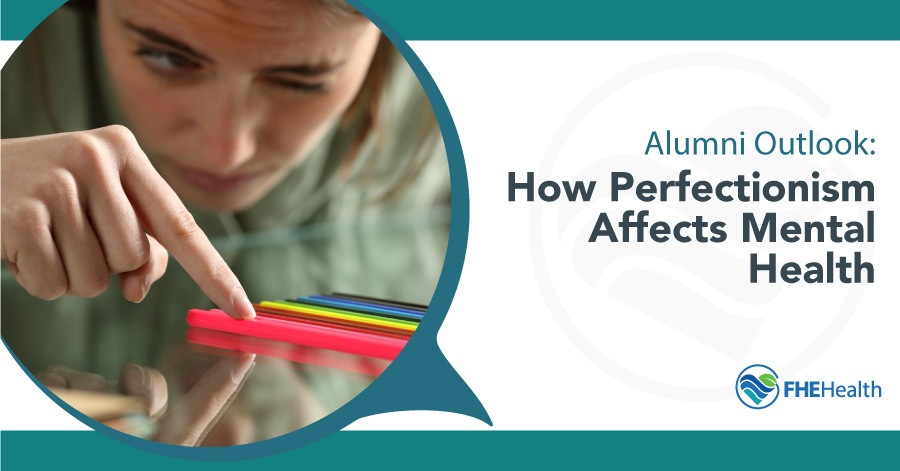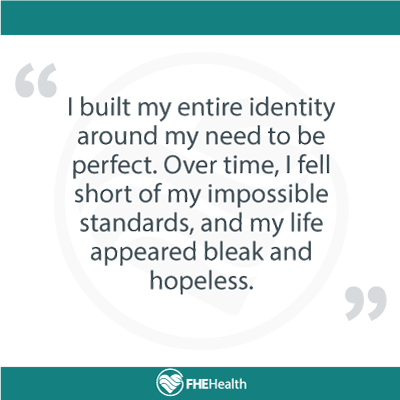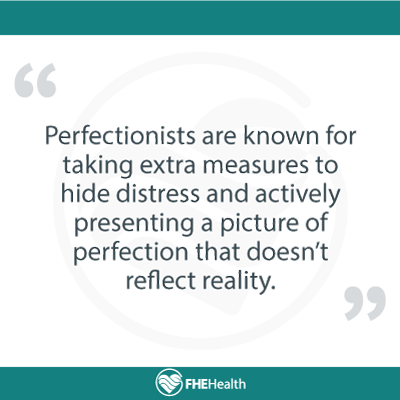
Before we dive into the direct connection between mental health and perfectionism, I have a confession to make. I am unequivocally a perfectionist. Maybe it’s the thrill of chasing an unattainable outcome, or perhaps it dives deeper into my psyche and taps into the part of me that feels perfection is the only guaranteed way to obtain someone’s love and approval. Either way, if there were a quiz or checklist to determine a perfectionist, I’d score 100+.
I can remember the feelings of utter inadequacy when I received my first “B” in middle school. I can remember the critical narrative running through my head when I didn’t make the cheerleading team at school, but all of my friends did. Perfectionism is said to be a “broad personality style, characterized by a hypercritical relationship with oneself.” Setting high standards and aiming for greatness are healthy, positive traits; perfectionism is dysfunctional and toxic.
 As it turns out, my innate feelings of rejection and abandonment are directly correlated with my perfectionism. Growing up, I can’t remember a time when I didn’t feel permanently damaged and flawed. In an attempt to underscore that nagging self-perception, I gravitated towards perfectionism. Maybe if I could do school, my chores, or some sport perfectly – then I could be lovable and worthy. I built my entire identity around my need to be perfect. Over time, I fell short of my impossible standards, and my life appeared bleak and hopeless.
As it turns out, my innate feelings of rejection and abandonment are directly correlated with my perfectionism. Growing up, I can’t remember a time when I didn’t feel permanently damaged and flawed. In an attempt to underscore that nagging self-perception, I gravitated towards perfectionism. Maybe if I could do school, my chores, or some sport perfectly – then I could be lovable and worthy. I built my entire identity around my need to be perfect. Over time, I fell short of my impossible standards, and my life appeared bleak and hopeless.
Just as trying to mix oil with water, my attempts were futile. Eventually, my perfectionism led me to never complete anything. I would start a hobby, interest, or idea, and if I believed I couldn’t master the task, I’d quit. To avoid not achieving perfection, I’d quit. I wouldn’t practice harder or learn from my failures; I’d chop up my imperfections to unworthiness and inadequacy. My perfectionism played a direct role in my mental health. I have been an anxious human for as long as I can remember. Depression was a foe that reminded me how fundamentally flawed I truly was.
Speaking in more general terms, perfectionism is a character defect that plagues our society today. In a world spent in isolation due to a global pandemic combined with social media running our lives, it’s merely impossible not to compare ourselves to the stories we see portrayed on our screens. These social media platforms fuel unhealthy comparisons as we try to “keep up with the Joneses.” We scroll through feeds of perfectly curated posts that naturally we feel less than and seek perfection to help us attain that seemingly perfect post.
 A meta-analysis of 284 studies on perfectionism found a direct correlation between depression, anxiety, eating disorders, self-harm, and obsessive-compulsive disorder. Beyond these named disorders, perfectionism also leads to chronic stress, headaches, fatigue, and insomnia. Perfectionism often comes in three different forms: self-oriented, other-oriented, and socially prescribed. Self-oriented perfectionism is my perfectionism of choice, which is brought on by yours truly. Other-oriented perfectionism is when an individual demands perfection from others around them. And socially prescribed perfectionism comes in the form of feeling the pressure to be perfect based on the world around us.
A meta-analysis of 284 studies on perfectionism found a direct correlation between depression, anxiety, eating disorders, self-harm, and obsessive-compulsive disorder. Beyond these named disorders, perfectionism also leads to chronic stress, headaches, fatigue, and insomnia. Perfectionism often comes in three different forms: self-oriented, other-oriented, and socially prescribed. Self-oriented perfectionism is my perfectionism of choice, which is brought on by yours truly. Other-oriented perfectionism is when an individual demands perfection from others around them. And socially prescribed perfectionism comes in the form of feeling the pressure to be perfect based on the world around us.
Studies have shown a genetic component of perfectionism and most certainly environmental factors in early childhood that play a part. Success-focused parenting has been noted to directly impact children as they grow up and ultimately turn to perfectionism. Kids need unconditional love, the kind of love that has no strings attached to math scores or successes in sports. If a parent only rewards a child for their achievements, over time, that child will learn that their value is determined by how perfect they are. Rather than focusing on the accolades of our little ones, it is vital that we also talk about the failures and even acknowledge the appreciation of “normal days.”
 Years of research on perfectionism have revealed that perfectionism is associated with suicidal thinking and behaviors. Suicidal thoughts and impulses are more common among perfectionists than most of the rest of the population. Perfectionists are known for taking extra measures to hide distress and actively presenting a picture of perfection that doesn’t reflect reality. These facades are usually recognized by the people closest to the perfectionist. Perfectionism is an unattainable delusion that leads to stress, anxiety, depression, low self-esteem, and suicidal ideations.
Years of research on perfectionism have revealed that perfectionism is associated with suicidal thinking and behaviors. Suicidal thoughts and impulses are more common among perfectionists than most of the rest of the population. Perfectionists are known for taking extra measures to hide distress and actively presenting a picture of perfection that doesn’t reflect reality. These facades are usually recognized by the people closest to the perfectionist. Perfectionism is an unattainable delusion that leads to stress, anxiety, depression, low self-esteem, and suicidal ideations.
When seeking perfection takes us into the realm in which the narrative in our head tells us that perfectionism is tied to our safety and lovability as a human, our mental health is directly impacted. I truly believed if I could do things perfectly, then I would be loved and safe. When I failed, you can imagine the toll it took on my mental health. All at once, I was unlovable, rejected, sure to be abandoned, and going to wind up alone and empty in life. Naturally, this created my own personal trench that I couldn’t climb my way out of.
The antidote to perfectionism? Acceptance. I still struggle with this insane idea that I have to do work perfectly, do mom life perfectly, sponsor perfectly, speak perfectly, the list goes on. Thankfully, I have taken a long hard look at my character defects, and I can see when my perfectionism crops up. Aiming for perfection no longer serves me. Striving for greatness but accepting the outcome no matter what has shifted my perception and placed me back on the path of falling in love with myself.
Treating perfectionism is often compared to treating a child who is afraid of the monster under the bed. People who struggle with perfectionism believe that they will become more lovable and acceptable, but these people are often noted to be more guarded and hostile. It is often beneficial for someone struggling with perfectionism to seek out therapy and acknowledge their struggle. Furthermore, it is often helpful for the individual to learn how to identify moments when their perfectionism crops up. Instead of being critical, try to figure out what exactly they need at that moment. Self-compassion stifles a critical, perfectionistic mindset.






